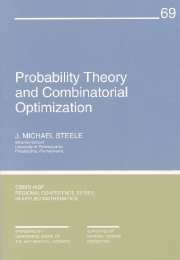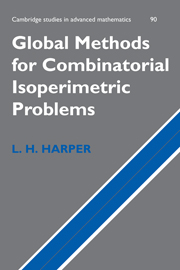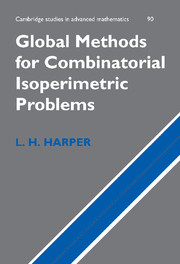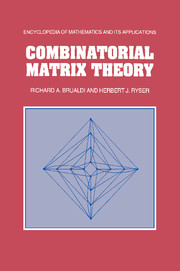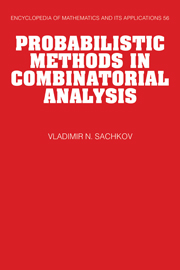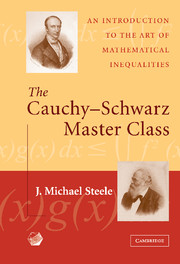Probability Theory and Combinatorial Optimization
This monograph provides an introduction to the state of the art of the probability theory that is most directly applicable to combinatorial optimization. The questions that receive the most attention are those that deal with discrete optimization problems for points in Euclidean space, such as the minimum spanning tree, the traveling-salesman tour, and minimal-length matchings. Still, there are several nongeometric optimization problems that receive full treatment, and these include the problems of the longest common subsequence and the longest increasing subsequence. The philosophy that guides the exposition is that analysis of concrete problems is the most effective way to explain even the most general methods or abstract principles.
Product details
December 1997Paperback
9780898713800
167 pages
250 × 177 × 9 mm
0.304kg
This item is not supplied by Cambridge University Press in your region. Please contact Soc for Industrial & Applied Mathematics for availability.
Table of Contents
- Preface
- 1. First View of Problems and Methods. A first example. Long common subsequences
- Subadditivity and expected values
- Azuma's inequality and a first application
- A second example. The increasing-subsequence problem
- Flipping Azuma's inequality
- Concentration on rates
- Dynamic programming
- Kingman's subadditive ergodic theorem
- Observations on subadditive subsequences
- Additional notes
- 2. Concentration of Measure and the Classical Theorems. The TSP and quick application of Azuma's inequality
- Easy size bounds
- Another mean Poissonization
- The Beardwood-Halton-Hammersly theorem
- Karp's partitioning algorithms
- Introduction to space-filling curve heuristic
- Asymptotics for the space-filling curve heuristic
- Additional notes
- 3. More General Methods. Subadditive Euclidean functionals
- Examples. Good, bad and forthcoming
- A general L-(infinity) bound
- Simple subadditivity and geometric subadditivity
- A concentration inequality
- Minimal matching
- Two-sided bounds and first consequences
- Rooted duals and their applications
- Lower bounds and best possibilities
- Additional remarks
- 4. Probability in Greedy Algorithms and Linear Programming. Assignment problem
- Simplex method for theoreticians
- Dyer-Frieze-McDiarmid inequality
- Dealing with integral constraints
- Distributional bounds
- Back to the future
- Additional remarks
- 5. Distributional Techniques and the Objective Method. Motivation for a method
- Searching for a candidate object
- Topology for nice sets
- Information on the infinite tree
- Dénoument
- Central limit theory
- Conditioning method for independence
- Dependency graphs and the CLT
- Additional remarks
- 6. Talagrand's Isoperimetric Theory. Talagrand's isoperimetric theory
- Two geometric applications of the isoperimetric inequality
- Application to the longest-increasing-subsequence problem
- Proof of the isoperimetric problem
- Application and comparison in the theory of hereditary sets
- Suprema of linear functionals
- Tail of the assignment problem
- Further applications of Talagrand's isoperimetric inequalities
- Final considerations on related work
- Bibliography
- Index.

